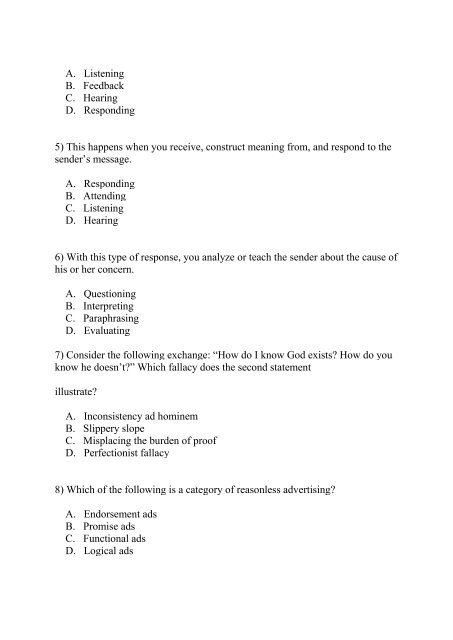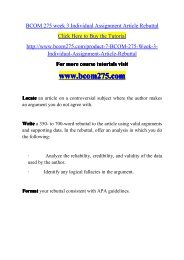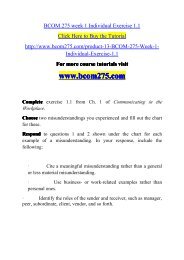BCOM 275 Final Exam Guide 4.-bcom275dotcom
For more course tutorials visit www.bcom275.com 1) The term channel in communication means A. the medium through which a message travels from sender to receiver B. the context of the communication C. the volume at which a message is received D. the process of changing thoughts into symbols 2) This preparation process involves looking at the characteristics of the receivers of the sender’s message. A. Determining the message B. Audience analysis C. Channel evaluation D. Receiver response analysis 3) A receiver’s response to a sender’s message is called A. channel B. feedback C. encoding D. decoding 4) This act is involuntary and happens automatically.
For more course tutorials visit
www.bcom275.com
1) The term channel in communication means
A. the medium through which a message travels from sender to receiver
B. the context of the communication
C. the volume at which a message is received
D. the process of changing thoughts into symbols
2) This preparation process involves looking at the characteristics of the receivers of the sender’s message.
A. Determining the message
B. Audience analysis
C. Channel evaluation
D. Receiver response analysis
3) A receiver’s response to a sender’s message is called
A. channel
B. feedback
C. encoding
D. decoding
4) This act is involuntary and happens automatically.
- No tags were found...
You also want an ePaper? Increase the reach of your titles
YUMPU automatically turns print PDFs into web optimized ePapers that Google loves.
A. Listening<br />
B. Feedback<br />
C. Hearing<br />
D. Responding<br />
5) This happens when you receive, construct meaning from, and respond to the<br />
sender’s message.<br />
A. Responding<br />
B. Attending<br />
C. Listening<br />
D. Hearing<br />
6) With this type of response, you analyze or teach the sender about the cause of<br />
his or her concern.<br />
A. Questioning<br />
B. Interpreting<br />
C. Paraphrasing<br />
D. Evaluating<br />
7) Consider the following exchange: “How do I know God exists? How do you<br />
know he doesn’t?” Which fallacy does the second statement<br />
illustrate?<br />
A. Inconsistency ad hominem<br />
B. Slippery slope<br />
C. Misplacing the burden of proof<br />
D. Perfectionist fallacy<br />
8) Which of the following is a category of reasonless advertising?<br />
A. Endorsement ads<br />
B. Promise ads<br />
C. Functional ads<br />
D. Logical ads
















